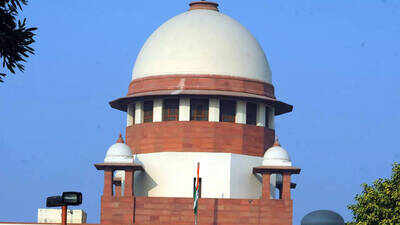Top Searches
- News
- City News
- delhi News
- No respite, LeT terrorist in Red Fort attack will hang, declares Supreme Court
No respite, LeT terrorist in Red Fort attack will hang, declares Supreme Court

Supreme Court (File photo)
NEW DELHI: Observing that aggravating circumstances of attacking the unity, integrity and sovereignty completely outweigh the factors which may even remotely be considered as mitigating circumstances, the Supreme Court on Thursday upheld the death sentence to Lashkar-e-Toiba militant Mohammed Arif in Red Fort attack case in which three three Army jawans lost their lives in 2000.
A bench of Chief Justice U U Lalit, S Ravindra Bhat, Bela M Trivedi dismissed Arif's petition seeking review of apex court's earlier order by which his conviction and death sentence was upheld. Interestingly, the apex court had earlier rejected his first review plea and also curative petition in an in-chamber proceedings but agreed to hear his second review plea in light of a constitution bench ruling that review petition in death sentence be heard in open court by a three judge bench.
Dismissing his plea in which he contended that he be given an opportunity to reform and death sentence be commuted, the bench said, “there is nothing on record which can be taken to be a mitigating circumstance in favour of the review petitioner. The suggestion that there is a possibility of retribution and rehabilitation is not made out from and supported by any material on record...the aggravating circumstances evident from the record and specially the fact that there was a direct attack on the unity, integrity and sovereignty of India, completely outweigh factors that may even remotely be brought into consideration as mitigating circumstances...”
The court said other grounds raised by him for not relying on electronic evidence, even if it is accepted, was also not sufficient enough as there was other evidence which proved his guilt beyond doubt. The court noted that the findings on the issue of the receipt and disbursal of money and the fact that the police could reach the spot referred to in the judgement, at his instance, were crucial circumstances.
Referring to finding that the rifle used in the assault was recovered from behind Red Fort and Vijay Ghat at his instance, the bench said, "It must be observed that even after eschewing circumstances ‘h’ and ‘j’ (pertaining to call records) which were directly attributable to the CDRs relied upon by the prosecution, the other circumstances do clearly spell out and prove beyond any doubt the involvement of the review petitioner in the crime." Arif, a Pakistani national, was prosecuted by a Delhi court and awarded death sentence in October 2005.
A bench of Chief Justice U U Lalit, S Ravindra Bhat, Bela M Trivedi dismissed Arif's petition seeking review of apex court's earlier order by which his conviction and death sentence was upheld. Interestingly, the apex court had earlier rejected his first review plea and also curative petition in an in-chamber proceedings but agreed to hear his second review plea in light of a constitution bench ruling that review petition in death sentence be heard in open court by a three judge bench.
Dismissing his plea in which he contended that he be given an opportunity to reform and death sentence be commuted, the bench said, “there is nothing on record which can be taken to be a mitigating circumstance in favour of the review petitioner. The suggestion that there is a possibility of retribution and rehabilitation is not made out from and supported by any material on record...the aggravating circumstances evident from the record and specially the fact that there was a direct attack on the unity, integrity and sovereignty of India, completely outweigh factors that may even remotely be brought into consideration as mitigating circumstances...”
The court said other grounds raised by him for not relying on electronic evidence, even if it is accepted, was also not sufficient enough as there was other evidence which proved his guilt beyond doubt. The court noted that the findings on the issue of the receipt and disbursal of money and the fact that the police could reach the spot referred to in the judgement, at his instance, were crucial circumstances.
Referring to finding that the rifle used in the assault was recovered from behind Red Fort and Vijay Ghat at his instance, the bench said, "It must be observed that even after eschewing circumstances ‘h’ and ‘j’ (pertaining to call records) which were directly attributable to the CDRs relied upon by the prosecution, the other circumstances do clearly spell out and prove beyond any doubt the involvement of the review petitioner in the crime." Arif, a Pakistani national, was prosecuted by a Delhi court and awarded death sentence in October 2005.
FOLLOW US ON SOCIAL MEDIA
FacebookTwitterInstagramKOO APPYOUTUBE
Start a Conversation
end of article









